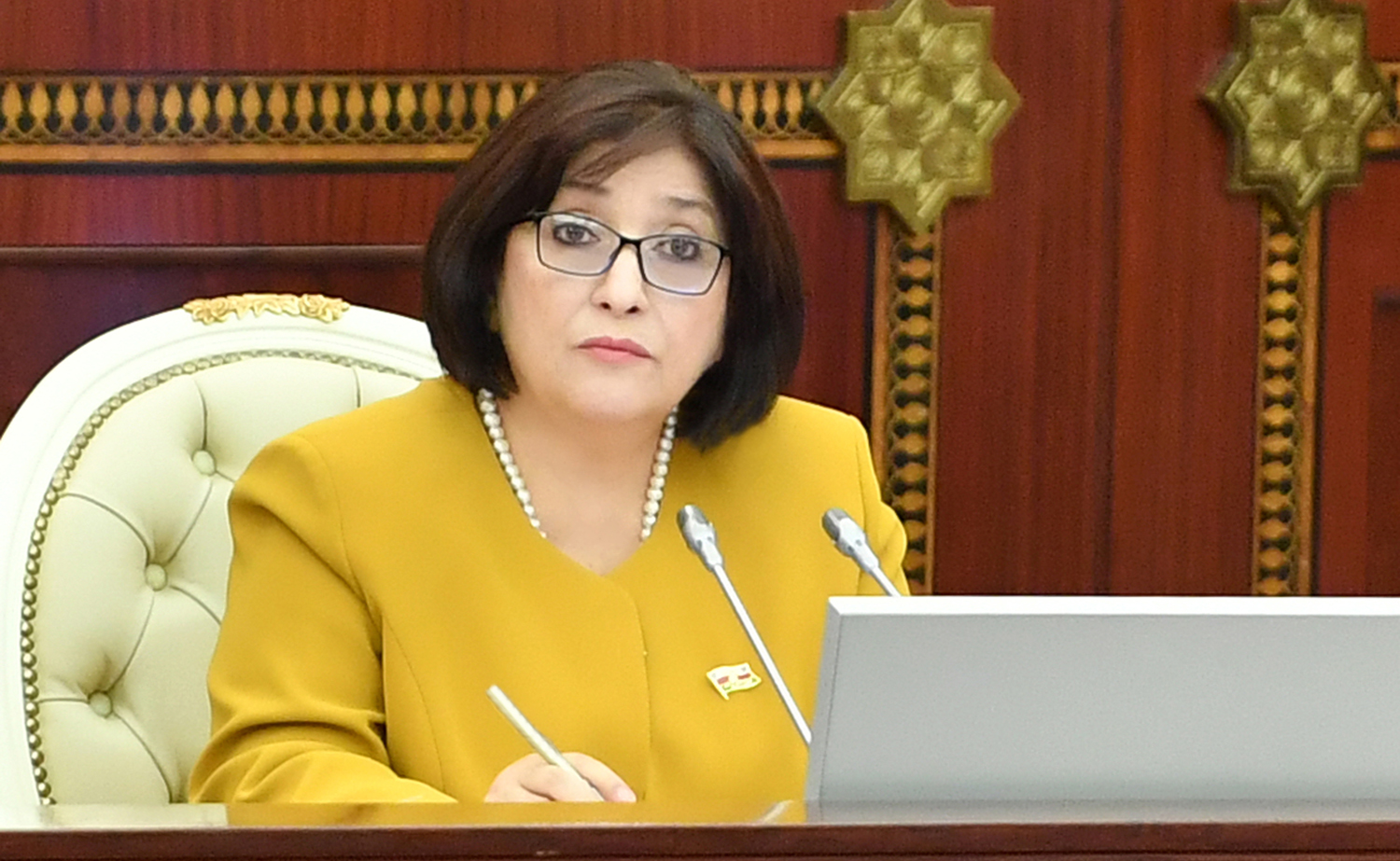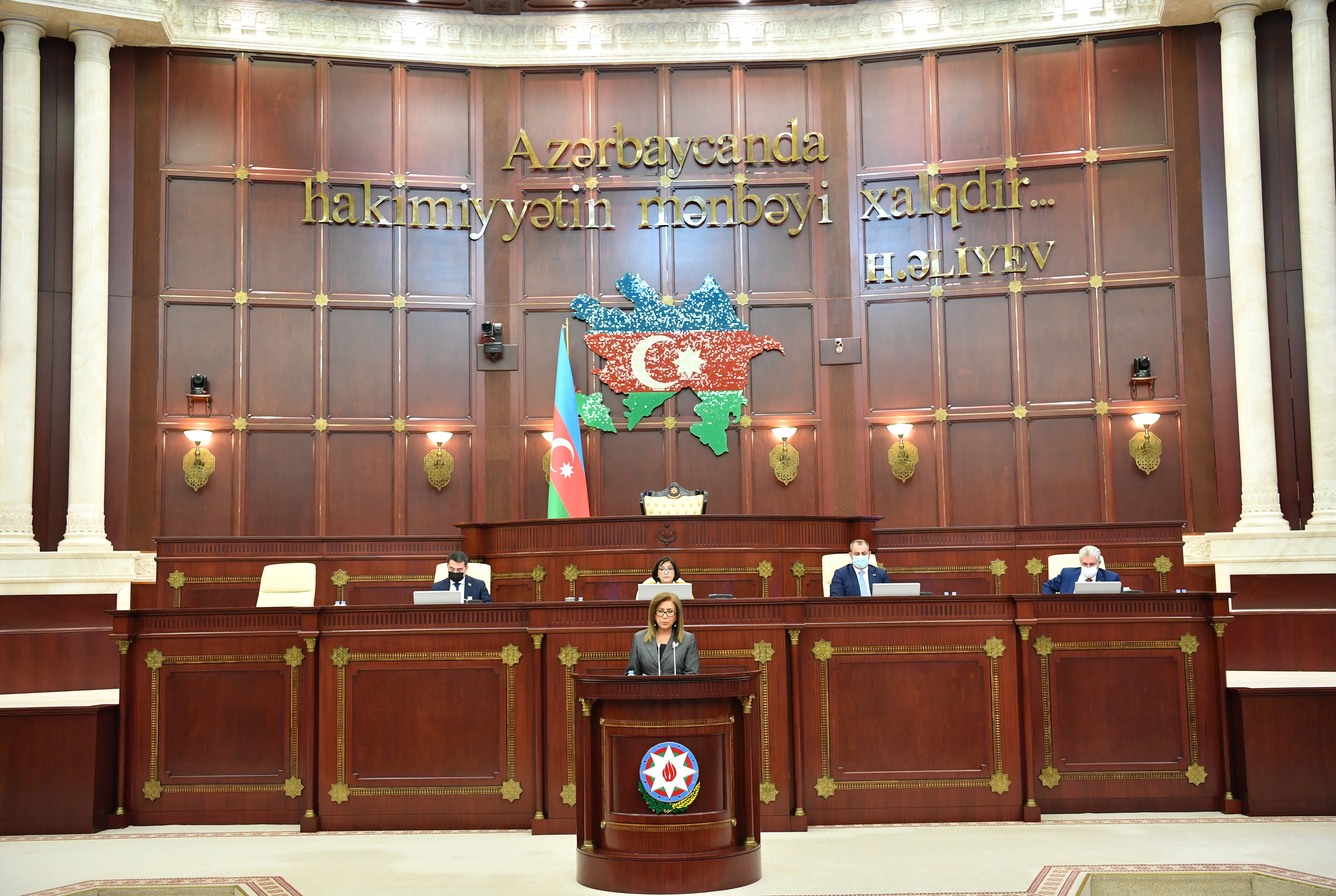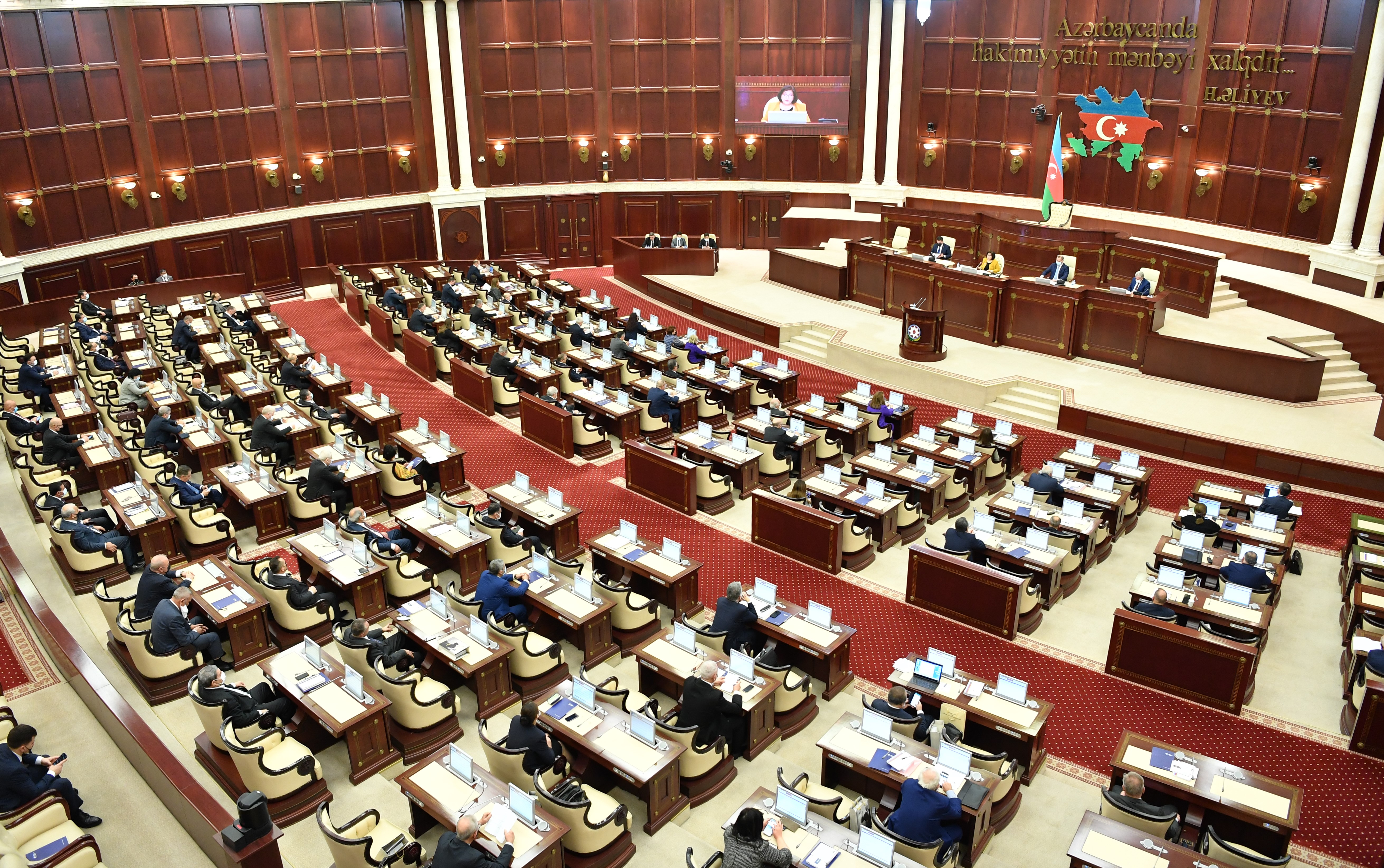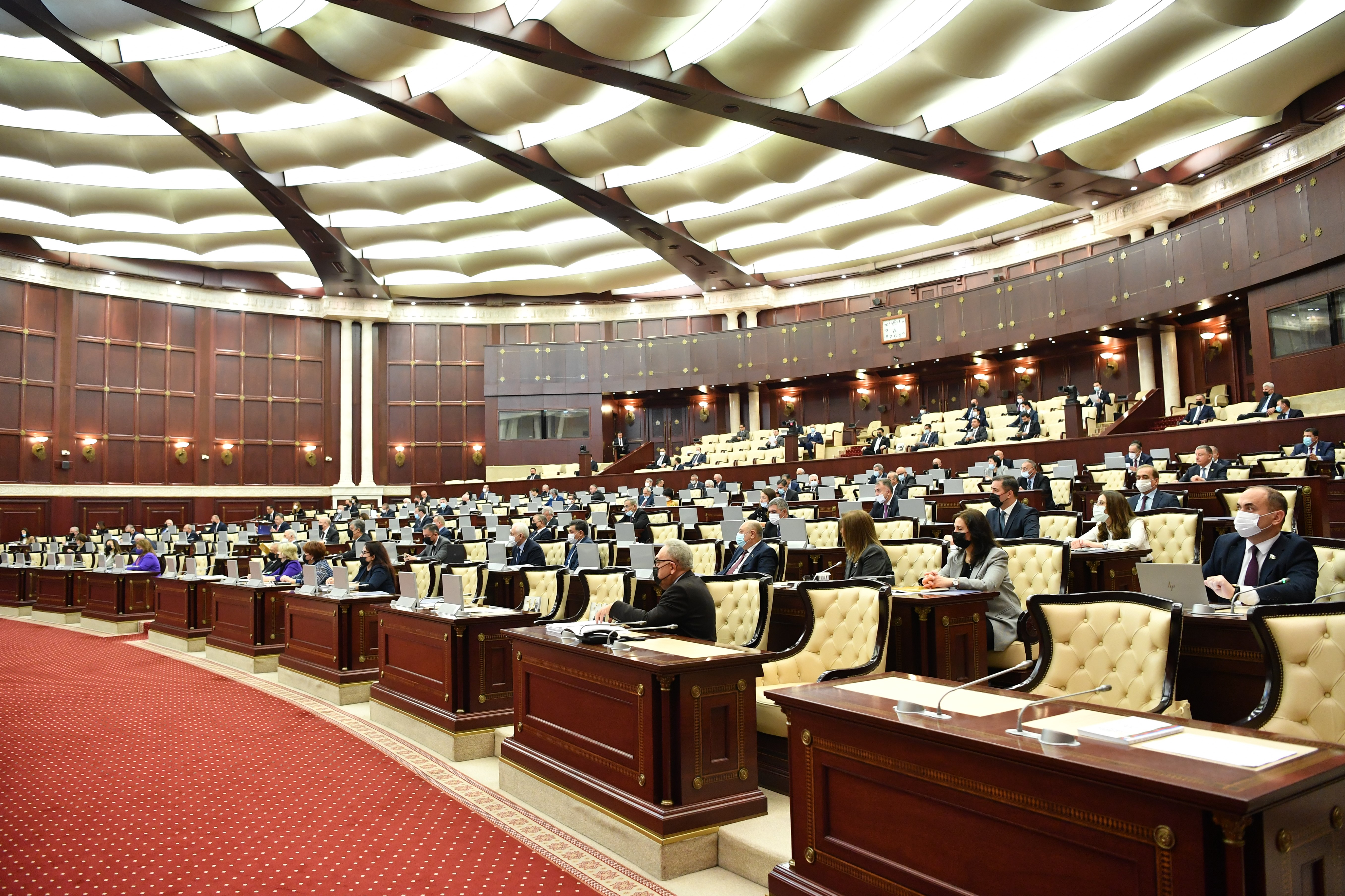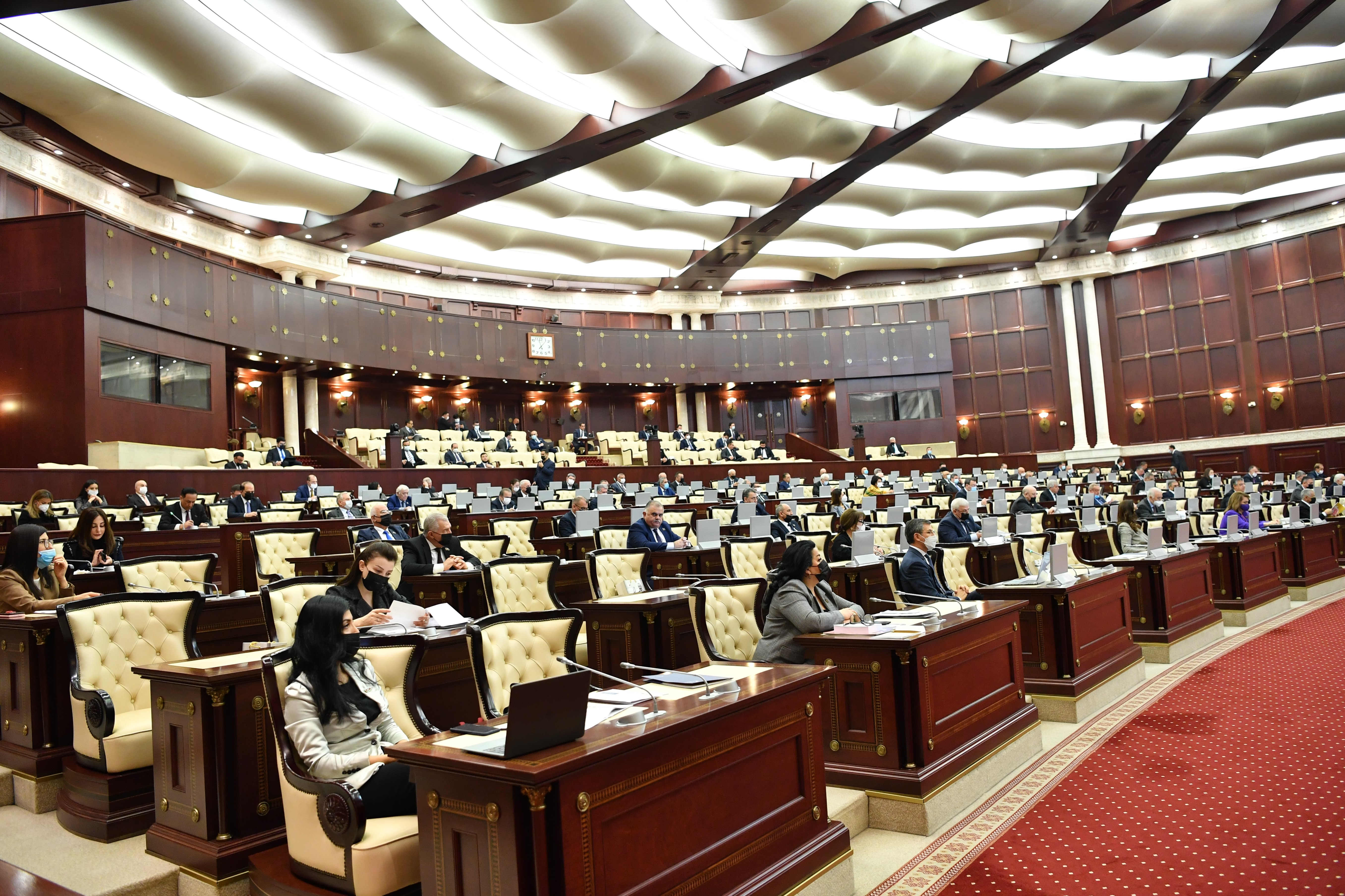Milli Majlis Hears 2020 Gender Equality Maintenance Account
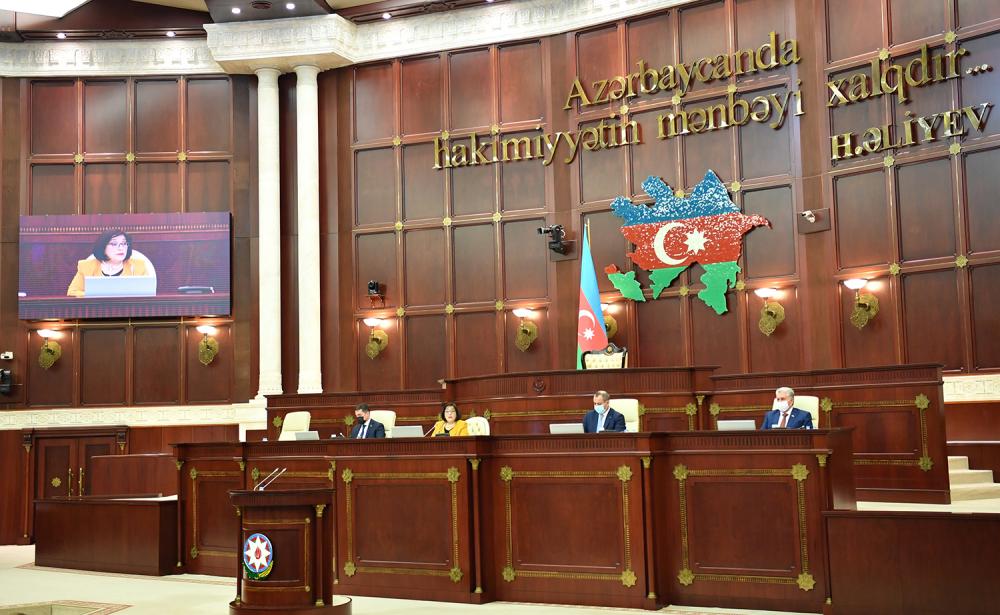
A scheduled plenary sitting of the autumn session of the Milli Majlis went under the chairmanship of Speaker Sahiba Gafarova on 27 December. It began with the adoption of the agenda and continued with a discussion of the issues du jour.
The issues prominent currently were talked of by the MPs Ali Masimli, Aghil Abbas, Razi Nurullayev, Etibar Aliyev, Aghiya Nakhchivanli, Soltan Mammadov, Mushfig Jafarov, Mushfig Mammadli, Ramil Hasan and Bahrouz Maharramov. They touched on the concerns of the people in their respective constituencies, brought up a number of currently relevant matters and made several proposals.
Next, the assembly started with the items on the agenda of the plenum.
Sahiba Gafarova told the House that Item I would be the annual report by the executive authority controlling the maintenance of gender equality.
That information was given by Chair of the State Committee for Family, Women’s and Children’s Problems Bahar Muradova who, as she spoke about the gender maintenance efforts of 2020, mentioned that year having become one of the historic victory over the Armenian Fascism in the scrolls of the country and the nation. Apart from that victory, the same year was marked by achievements in bridling COVID-19; on the other hand, though, thousands of our compatriots were facing very diverse problems posed by the war and the pandemic. Certain circumstances found in households and across the society were causing concern, too, according to Mrs Muradova.
Serious steps were taken throughout 2020 to promote the means and tools of maintaining gender equality. The work was continued on streamlining the applicable regulatory and legislative frameworks. The adoption of the 2020-2023National Action Plan against Household Violence in the Azerbaijan Republic pursuant to the relevant presidential decree made it possible to put the counteraction on new tracks with the subsequent graduation to a new stage in fighting this evil, according to Mrs Muradova.
The report year also saw on-going co-operation with international entities; relevantly themed training courses, seminars and webinars were organised and conducted; educational materials and recommendations were put together.
Inasmuch as the strengthening of the pertaining institutional mechanisms is concerned, the year 2020 had the Children and Families Support Centres (CFSC) geared into extensive action, benefitting as many as 25,023 people (9,876 households) ultimately.
The municipalities of 15 provinces and towns were assisted in forming their gender panels; 3 support centres were opened for household violence victims. The women’s resource centres extended psychological aid to 880 and other aid, as required, to a further 440 households during the COVID-19 pandemic. Besides, the 860 Hotline of the State Committee has been up without interruptions since 1 December 2020.
Bahar Muradova also touched on the analysis of the incoming correspondence the State Committee had during 2020. The most frequent gender discrimination cases had to do with cancelation of employment contracts with pregnant women and mothers caring for young children, preference of male employment candidates, blinking at the benefits for employed mothers and several other phenomena. On the one hand, there was an observable reduction in the number of crimes connected to household violence; but on the other, such occurrences may not necessarily bring about universal condemnation still. Though early marriages reduced in number, it proved impossible to eradicate the practice in the reference year. The question of gender selection remained on the agenda throughout 2020 as well; there was a visible derangement of the biologically normal sex ratio in the new-borns.
Women’s involvement in state administration and decision-making rose compared with precedent years and continues on the rise today as well, according to Mrs Muradova who presented to the House the statistical figures telling of women’s representation in government authorities.
Going forth, Mrs Muradova turned to the problems of gender equality in discharge of employment rights. She told the assembly of the ratio of men and women in that area as well as she did about the steps that the public agencies are taking to promote self-employment and business enterprising amongst women.
As regards exercising the right to education and the accompanying rights, ensuring equal opportunities in this context is one of the paramount tasks of the Azerbaijani Government. As a rule, according to Mrs Muradova, women prevail on the staffs of both tertiary and secondary education institutions as well as in of special primary education facilities. Men, meanwhile, constitute a majority of office-holders with the exception of chief officers of secondary special educational institutions.
The tasks of discouraging the obstruction of girls’ education and of removing gender-based stereotypes from the educational thematic remained in the focus in the reported period.
The State Committee never let out of sight the matters the MPs had raised when the previous annual report had been discussed, and was working on addressing them properly. Generally speaking, Mrs Muradova pointed out, our common goal is to build a society that would be advancing with reliance upon the material and moral pillars, one in which gender roles would be delineated correctly and mutual obligations and responsibilities divided equitably.
Chair of the Milli Majlis Family, Women’s and Children’s Affairs Committee Hijran Huseynova said that, it being in compliance with Article 20 of the Law of the Azerbaijan Republic ‘On Maintaining the Gender Equality (of Men and Women)’, the 2020 performance report submitted by the State Committee to the Milli Majlis was written on 52 pages and consisted of a preamble and the four principal parts telling of the gender equality application areas. The document is acceptable and to the point; it generally affirms the on-going implementation of the gender equality policy by the State Committee. MP Huseynova added that the State Committee had implemented a string of new projects and drawn up important draft documents in terms of streamlining the relevant legislation – all that despite of the continuing pandemic as well as the war first, and the post-war circumstances after.
No strong and stable state is imaginable in which women would not be engaged in all the aspects of public life, which is why the global agenda coincides with the goals that individual countries set before themselves, according to the chair of the parliamentary committee.
Relevant universal initiatives are growing in number. As they were taking part in the Third Eurasian Women’s Forum in St Petersburg on 13 October this year, the delegation led by the Speaker of the Milli Majlis Sahiba Gafarova told of the successes of Azerbaijani women and their contribution to the global women’s movement – they told about it at the plenum and at the thematic sessions of that forum. There were the relevant reports and presentations. They reiterated the need in the safe and equal access to economic resources, technological and financial resources and employment as well as education opportunities to facilitate gender equality.
Going further, Hijran Huseynova emphasised the care of the cause taken by the president and first vice president of the Azerbaijan Republic – Mr Ilham Aliyev and Mrs Mehriban Aliyeva respectively.
Debates followed. The MPs Fazil Mustafa, Etibar Aliyev, Siyavush Novruzov, Malahat Ibrahimghizi, Elman Nasirov, Rashad Mahmudov, Nigyar Arpadarai, Sabina Khasayeva, Razi Nurullayev and Erkin Gadirli attributed gender inequality, early marriages, obstruction of education for girls and the gender imbalance in new-borns to lacunas in the gender culture. They put forth some ideas and suggestions regarding the work that they said needed to be done by the specialist agencies to strengthen and enhance that culture in the country. The MPs also talked about making the relevant enlightenment more efficient, improving the related legislation and, especially importantly, tightening the enforcement of the relevant laws.
Chair of the State Committee for Family, Women’s and Children’s Problems Bahar Muradova provided the necessary clarifications. She also told the House about the state stance on the subject, the work that is being done currently and the prospects in the specific areas worrying the law-makers.
The annual report by the executive authority controlling the maintenance of gender equality was noted after the deliberations.
Next, Chairman of the parliamentary Committee of Labour and Social Policy Musa Guliyev tabled the third reading of the Bill on Tourism which, he did not omit to mention, the House had supported on principle at the second reading. There were some improvement ideas, though; they were considered thoroughly together with the draft’s authors at the expanded committee meeting in the format of the third reading. Many of those ideas pertain to the general problems of tourism whereas the others are rather recommendations about how the future law must be enforced. The Tourism Agency has decided that all those matters will be taken into account when appropriate documents are put together after the law has been enacted. The MPs’ remarks about the four thematic areas that the document encompasses have been taken into account duly: the concerned articles of the draft law have been corrected as needed, according to MP Guliyev.
The new law will provide for stable development of tourism; to achieve such development, it will introduce the basics of state administration and regulation mechanisms for the industry together with rules of using tourism resources rationally and efficiently and, lastly, the new law defines the funding sources for the industry.
The MPs Mazahir Efendiyev and Fazil Mustafa made known the favourable conclusions regarding the Bill of the Economic Policy, Industries and Enterprising Committee and of the Culture Committee respectively. Then, the Tourism Bill was voted through the third reading.
Kamal Jafarov of the Law Policy and State-Building Committee submitted the third-reading amendments to the Code of Administrative Offences that add to it the new article 428-1.
The supportive statements by the Labour and Social Policy Committee, the Culture Committee and the Economic Policy, Industries and Enterprising Committee were presented by the committee chairman Musa Guliyev and the MPs Fazil Mustafa and Mazahir Efendiyev respectively. The amendments were put on vote and adopted in the third reading.
Speaker Sahiba Gafarova let it be known that the agenda items 4th to the 17th had arrived at the Milli Majlis in one package containing the interconnected draft laws.
Chairman of the Economic Policy, Industries and Enterprising Committee Tahir Mirkishili informed the plenum participants of the draft laws, all in the third reading. Certain matters were raised during the second reading; so, the draft now contains adequate corrections. Those corrections, in turn, have brought about relevant technical changes to be made in the laws ‘On Lotteries’, ‘On State Procurement’ and ‘On Telecommunication’ as well as in the Tax Code.
First Deputy Chair of the Milli Majlis/Chairman of the Law Policy and State-Building Committee Ali Huseynli told the House of the amendments to the Criminal Code and the Code of Administrative Offences. Mr Huseynli said that the Committee’s suggestions had been taken into account as the matter had been discussed with the originator of the legislative initiative. It is proposed to postulate a liability for gamble organisation and runs not in the charter of the Criminal Code about criminal offences but in that chapter which covers crimes against public morals. The edited Article 244-1 is being presented to the law-makers therefore.
As for the corresponding article of the Code of Administrative Offences, it defines sufficiently clearly all the acts that do not envisage organisation and conduct of gambling games. The same article defines the administrative liability for such acts. The notes to the article specify that organisation and conduct of gambling games entails criminal liability.
Deputy Chair of the Milli Majlis/Chairman of the Youth and Sports Committee Adil Aliyev mentioned the earlier remarks of his Committee’s members that he said had been taken into consideration duly. The Committee supported the Bills, Mr Aliyev added.
Tahir Rzayev and Zahid Oruj, too, indicated the favourable positions of the Agrarian Policy Committee and the Human Rights Committee that they chair respectively.
Chairman of the Regional Affairs Committee Siyavush Novruzov and MP Tahir Karimli shared their considerations about the amendments.
The per-draft vote ensued. The Bills containing the amendments to the Lotteries Law, to the Civil, Criminal and Tax Codes, to the laws ‘On Physical Education and Sports’, ‘On Licences and Permits’, ‘On Horse Breeding and the Equestrian Sports’, ‘On Advertisement’, ‘On State Procurement’, ‘On Telecommunication’, ‘On Apprehension of the Legalisation of Criminal Proceeds and the Finance of Terrorism’ and ‘On Information, Informatisation and Protection of Information’ as well as to the Code of Civil Procedure were all passed in the third reading.
Chair of the Milli Majlis Family, Women’s and Children’s Affairs Committee Hijran Huseynova tabled in the third reading the amendments to the Family Code, drawn up on the force of the presidential decree ‘On Expanding the Implementation of e-Services in the State Registration of Vital Records’ dated 23 September 2020. The goals there are to improve vital acts’ state registration, ensure citizen satisfaction (with the facility) and, at the same time, to make the services prompter and more accessible.
MP Hikmat Mammadov commented on the amendments and highlighted several associated issues before the Bill was voted through the third reading.
Going further, Chairman of the International and Inter-Parliamentary Relations Committee Samad Seyidov offered the Milli Majlis to consider the third reading of the Bill ‘On Amending the Consular Charter of the Azerbaijan Republic adopted pursuant to the Law of the Azerbaijan Republic No 782 dated 8 February 1994’.
The consular offices of Azerbaijan are known to register births and deaths of the Azerbaijani citizens living abroad and of overseas nationals and apatrides resident in the Azerbaijan Republic on the basis of the medical certificates issued in concerned countries; such data are then fed into the State Population Register, which is why the Consular Charter needs amending.
Before that Bill could be voted through the third reading, Hijran Huseynova announced that the Family, Women’s and Children’s Affairs Committee had studied the draft and made a positive opinion statement about it.
That was the last item on the agenda of today’s plenary sitting of the Milli Majlis.
The Press and Public Relations Department
The Milli Majlis



